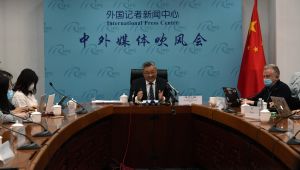This week, diplomats from China, France, Germany, Russia, Britain, and the United States, now called the Group of Six, met to discuss next steps to prevent Iran from acquiring nuclear weapons. U.S. Secretary of State Hillary Clinton signaled Russia's importance to this effort by consulting with her Russian counterpart Sergei Lavrov on the matter ahead of time. Despite U.S. and Western European preferences, any serious discussion of new sanctions apparently fizzled when Iran signaled that it had a new proposal, without delivering it.
The U.S. approach to Iran's nuclear program has long been built on the assumption that Russia's influence in Iran is key to reaching a solution. Indeed, as Iran's primary nuclear technology supplier, and one of its leading trade partners, Moscow would appear to have powerful leverage in Tehran. But the United States may be basing its policy on an illusion, for the Russians could be playing a double game.
With Russia's grudging support, the United Nations Security Council has passed three rounds of sanctions on Iran, aimed at halting its uranium enrichment program, which Tehran claims is for peaceful purposes, but could be used to make fissile material for weapons. The sanctions, however, have not halted the Iranian enrichment program and show little prospect of doing so soon. The International Atomic Energy Agency (IAEA) reported last February that Iran has produced sufficient low-enriched uranium for a nuclear weapon, if Tehran were to take the additional step of enriching it further. Meanwhile, centrifuges continue to spin at Natanz, and Iran has yet to convince the IAEA that its intentions are peaceful.
Although Moscow talks a good game on Iran's nuclear program, since Iran's clandestine uranium enrichment program was first exposed in 2002, Russia has consistently impeded effective action. The problem is not that the Russians doubt Iran's nuclear potential. In 2005, a Russian diplomat told me that compared with the Iranians, North Korean nuclear engineers (who have since conducted two nuclear tests) are "children," and warned that Russia's assessments of how soon Iran might attain a nuclear weapon are more pessimistic than those reported in the U.S. media. There are, however, reasons why keeping the issue alive is in Russia's interest, and therefore Moscow would prefer not to solve the problem anytime soon.
First, Russia benefits economically from a crisis with Iran. Not only is Russia Iran's leading nuclear vendor, it is also its foremost arms dealer, and demand for those arms increases with tensions. In 2007, Iran bought a $1 billion defense system from Russia and is now seeking even more sophisticated interceptors, likely to defend its nuclear sites. More significantly, even the possibility of military action against Iran and the probable consequences -- including attacks on oil shipments through the Strait of Hormuz -- inflates the price of oil. This matters to Moscow. Oil and gas accounted for almost two-thirds of Russia's export revenues at the peak of energy prices.
Second, the issue keeps Russia at the head table in international relations. Moscow's influence in the Middle East has waned for decades, with reversals of fortunes in Libya, Egypt, Syria, and Iraq. Relatively good relations with Iran give Moscow a toehold to influence events in a strategically vital part of the world. Membership in the Group of Six accords Russia significant influence on an important issue.
Third, the Iran nuclear issue creates leverage over the United States. Washington has already made clear that the matter is of vital interest -- all the better for Moscow to demand rewards for cooperation. Russia got a long-sought civil nuclear cooperation agreement from the George W. Bush administration (though it stalled in Congress over the invasion of Georgia), and is angling to pocket concessions on missile defense and arms control from the Barack Obama administration. The Kremlin may wish to prolong this happy circumstance to extract further gratuities.
Finally, do not discount the power of spite. Moscow is still smarting over the end of the Cold War and the rise of the United States as a "hyperpower." U.S. setbacks in Iraq and Afghanistan may have dulled, but did not deaden, that pain. Witness the sharp response to Vice President Joseph Biden's recent comments about Russia's weakening international position. If the United States is taken down a peg by Iran, it may well serve the Kremlin's purposes.
U.S. negotiators may yet convince the Group of Six to take more effective action on Iran, but only if they do not assume Russia's interests on the matter to be aligned with their own. It will require hard bargaining, not just appeals to reason, to persuade Moscow to be constructive. Moscow must understand that the absence of effective international action on Iran's nuclear program will drive other policies in directions anathema to the Kremlin. It will strengthen NATO unity. It will make missile defense deployments more imperative. Most of all, it will cause countries throughout Europe and the Middle East again to turn to the United States for protection and leadership. In short, Russia must be convinced that a diplomatic double game on Iran is not worth the candle.
Tobey, William. “Is Moscow Playing a Double Game on Iran's Nukes?.” Foreign Policy, September 4, 2009



